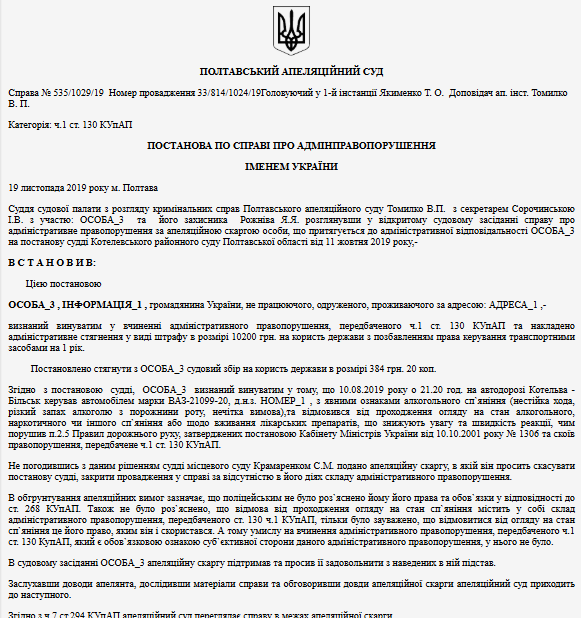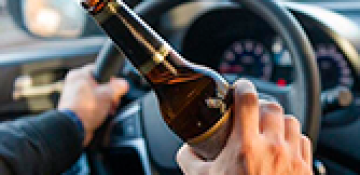My name is Rozhniv Yaroslav Yaroslavovych, I am a lawyer from Poltava. The key areas of law in which I provide assistance are civil, administrative, military law. Thanks to my experience, knowledge and individual approach, I will provide professional support at every stage.
Case Description:
The client filed an appeal requesting the cancellation of an administrative offense ruling issued for driving a vehicle under the influence of alcohol and refusal to undergo a medical examination. The attorney argued that the proper procedure was violated during the preparation of the administrative materials and that the person was not adequately informed of their rights.
Case Background:
On August 10, 2019, at around 21:20, the driver was operating a vehicle on a local road. The police stopped the car due to visible signs of alcohol intoxication: unsteady gait, smell of alcohol, and slurred speech. The driver refused to take an intoxication test.
Based on the refusal, the officers issued a report for an administrative offense under Part 1 of Article 130 of the Code of Ukraine on Administrative Offenses (CUAO) and submitted the case to court. The court of first instance found the individual guilty.
Issue:
- The driver disagreed with the ruling and appealed, stating that:
- He was not informed of his rights and obligations as required by Article 268 of the CUAO.
- He was not informed that refusal to undergo a test constitutes an administrative offense.
- He exercised his right to refuse the test without the intent to commit an offense.
- The presumption of innocence and the procedure for recording the violation were breached.
Objective:
- Challenge the unlawful ruling and police actions.
- Prove that there was no composition of an administrative offense.
- Restore the driver's rights, particularly the right to a fair trial.
Article 130 of the Code of Ukraine on Administrative Offenses (CUAO) is one of the most serious articles concerning driving under the influence or refusing to undergo a sobriety test.
Execution Steps:
Case Analysis:
The attorney conducted a thorough review of the case materials, video recordings, protocol, and procedural documents, identifying significant procedural violations in the preparation of administrative documents, which formed the basis for the ruling's cancellation.
Violation Identification:
Violations were identified during the recording of the offense, including failure to follow the procedural rules for informing the individual of their rights and the consequences of refusing the examination.
Court Appeal:
The attorney prepared an appeal with detailed justification highlighting the lack of offense composition and procedural violations.
Decision and Results:
The appellate court upheld the appeal, overturned the lower court's decision, and dismissed the case due to the absence of an administrative offense.
Thus, the attorney achieved full rehabilitation of the client by overturning a court decision that could have led to negative consequences such as fines, suspension of driving privileges, and inclusion in the registry of violators.
This case is an example of how professional legal assistance can protect citizens' rights, even in complex cases under Article 130 of the CUAO. Procedural violations, lack of proper information, and absence of intent are grounds for canceling unlawful rulings. Legal support is essential for a fair trial and effective defense of drivers' rights in court.































